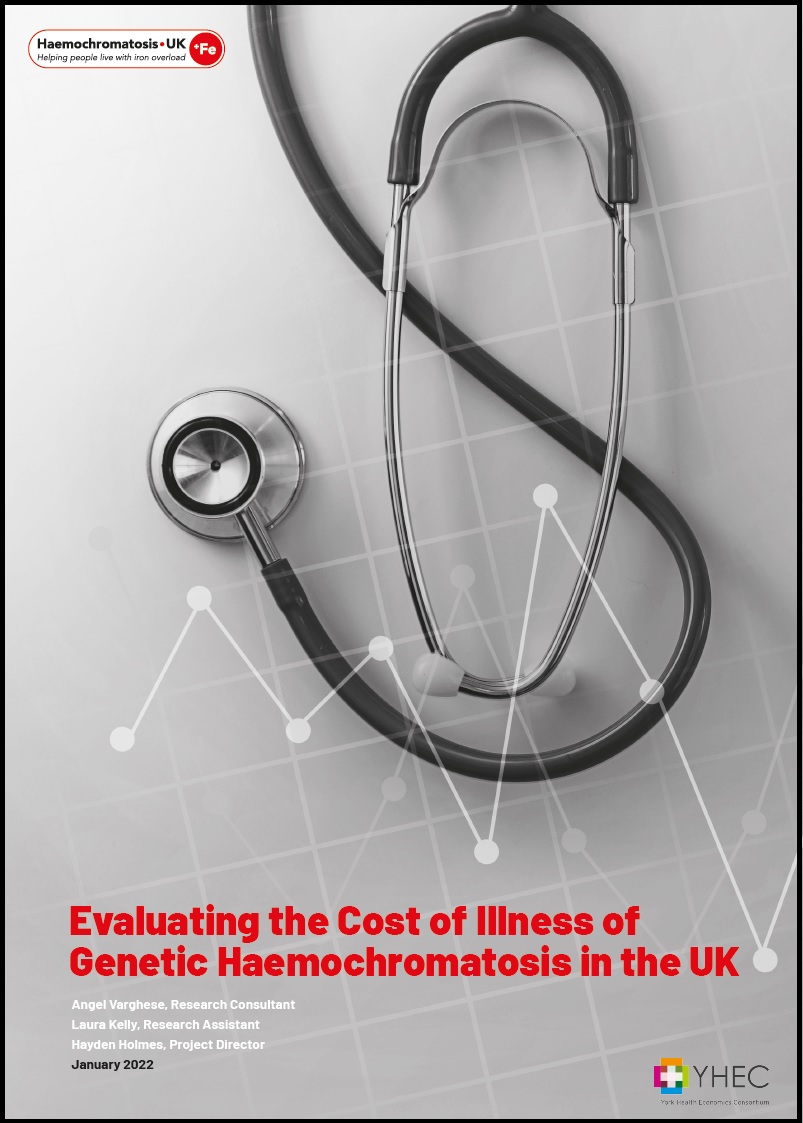Today, national charity Haemochromatosis UK launches its latest research report “Evaluating the Cost of Illness of Genetic Haemochromatosis in the UK”. This new health economics report, authored by researchers at the York Health Economic Consortium, reveals for the first time the true costs to the NHS of the burden of ill-health arising from genetic haemochromatosis (GH).
Genetic haemochromatosis is our most common inheritable undiagnosed genetic condition. About 1 in 150 people in England and Wales, 1 in 113 people in Scotland and 1 in 10 people in Northern Ireland are at risk. There’s no cure, but with early diagnosis and prompt treatment it can be managed. Untreated, the condition can cause cancer, liver disease, heart disease, acute joint pain and chronic fatigue. But when diagnosed early, the condition is manageable and not life-limiting. Treatment is simple and cost effective; primarily through regular blood donation.
For the first time, this ground-breaking study reveals :
· Genetic haemochromatosis isn’t rare – it’s rarely diagnosed. An estimated 1.2 million
[i] people in the UK are at risk of ill-health from GH.
· The NHS incurs £487 million
excess costs of care over a one-year time horizon – £270 million of this is spent on treating liver disease, cancer, osteoarthritis and associated ill-health
[ii].
· Over half the total excess costs are concerned with treating readily preventable conditions; costs would fall if diagnosis rates were improved.
· The bulk of the excess treatment costs are associated with treating liver disease and osteoarthritis – these should be a focus for NHS capacity planning.
· There are financial benefits attributable to the day-to-day management of the condition, through blood donation. The GH community represents a sustainable and growing supply of blood products, at a time when UK donor services are experiencing blood and donor shortages.
· There is a financial case for screening adults for genetic haemochromatosis; the costs of screening are dwarfed by the excess costs of treating the serious, avoidable ill-health revealed in this study.
In conclusion, early diagnosis of genetic haemochromatosis not only saves lives – it also saves money.
So, today Haemochromatosis UK is calling for the NHS to be pro-active in screening communities at risk, particularly those in northern England, Scotland and Northern Ireland where the condition is more common. We encourage NHS donor services to further improve and ease access to services for people affected by genetic haemochromatosis.
Katy Burns MBE, Chair of Trustees of the charity said : “This report illustrates the previously hidden economic consequences for the NHS in caring for illness caused by genetic haemochromatosis. It also underlines the profound impact that late or undiagnosed genetic haemochromatosis has on families affected.”
Neil McClements, Chief Executive of the charity noted : “Early diagnosis saves lives – it also saves money. We hope that this ground-breaking new research will prompt the NHS to start pro-active screening of communities at risk of genetic haemochromatosis.”
___
4. Diagnosed early, haemochromatosis is manageable and not life-limiting. Treatment is simple and cost effective; primarily through regular blood donation. Untreated, the condition can lead to iron overload which can cause a range of illnesses including liver cancer, diabetes, cardiomyopathy, liver disease, chronic fatigue and severe joint pain.
5. For photos, interview requests and background information, email media@huk.org.uk or call our office on 03030 401 101 (9am-3pm weekdays)
6. Haemochromatosis UK online
Twitter : @IronOverloadUK
